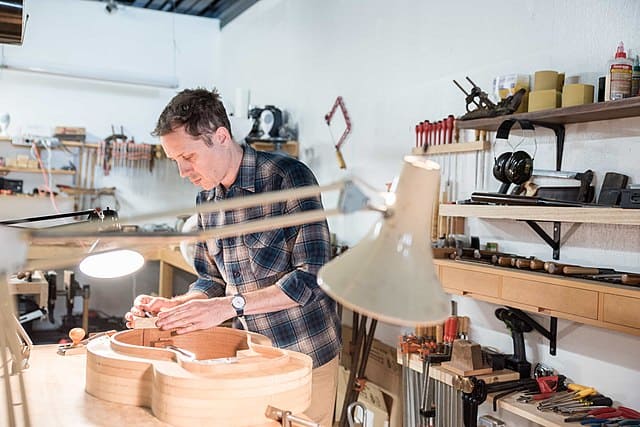The guitar is one of the most widely played instruments in the world. Listening to or playing this amazing instrument being played is one of the most soothing feelings you can have.
But have you ever wondered about the process behind building a guitar and just how long it takes to make a guitar from scratch?
Well, if you have had this question, we have you covered.
Building a regular guitar can take up to 3/4 weeks process. But this number varies massively. If you are looking for something that has more detailed work in it, that can take even 3 to 4 months. For custom-made guitars, you can be looking up even up to a few months to produce one guitar.
It can be a very complex process depending upon your expectation of the outcome. And, of course, not every guitar takes the same amount of time to be made.
There are mass-produced guitars by top brands, then custom ones especially tailored-made for top guitarists.
There are a lot of nuances to making a guitar. Handmade and machine-produced guitars have very different timelines.
While top brands also have their different methods and secrets for developing their masterpieces. Let’s have a deep dive into them.
How long do guitar factories take to make a guitar?
The exact length of time depends on various factors. For most of the manufacturing, the top brands have a stockpile of all the raw materials needed.
So the process is mostly assembly and making sure about the fine details. At Martin, it takes them 3-6 weeks to produce a guitar but at Fender, the timeline is close to 3-4 weeks.
How long do top brands’ custom shops take to finish a guitar?
Custom guitars are trickier to estimate in time.
It depends upon the requirements of the artists.
The more popular the artist, the more detailed work they tend to require.
In the Fender custom shop, it can take as long as 4 to 10 months to make a guitar.
Things like the availability of wood, backlogs of orders, the complexity of the structure, etc. can take ages to sort out.
It is said that even a 1/100 inch difference on like a neck can be spotted by some players so imagine the attention to detail they require.
How long do guitar luthiers take to finish an instrument?
Luthiers’ ability to produce a guitar depends hugely upon their expertise and experience.
Luthiers who produce guitar regularly and have years of experience can make one within a month.
In general, it can take up to 1-3 months to make a guitar.
A lot of luthiers do it more as a hobby so working on a part-time basis means that it takes a lot longer.
The details and complexity of the guitar also vary in the time required. Some guitars require a lot of small parts made with very high precision, taking a lot longer to make one guitar.
Are cheaper guitars made faster?
Cheaper guitars in general are made a lot faster compared to the high-end or custom-made ones.
Generic guitars which are cheaper, are mass-produced so brands already have a process in place to make them.
Most of the materials are stockpiled so they don’t have to spend time on things like individual wood selection or drying.
Also, these guitars are not completely handmade. There are robots and automation in place that do most of the work for these generic guitars.
Lastly, these instruments don’t require much attention to detail as there are already blueprints on how to make them. That means, quality control is a lot easier and requires less time to build.
What makes a guitar take longer to build?
If you are looking for a mass-produced, generic guitar, it takes a lot less time to build compared to a custom, tailor-made one.
For custom guitars, you need to find the right wood, make sure it is curated to be in the best condition, and make necessary parts like the neck manually.
All of these things end up taking a lot of time.
For the high-end guitars, there is a lot of attention to detail required. Everything has to be perfect from start to finish to produce the best quality of sound.
Also, there are a lot of processes involved that just can’t be done by machines and robots. As every guitar is built uniquely, these are developed by hand.
Lastly, custom and more expensive guitars go through a lot more vigorous level of quality control. As everything is done manually, it’s checked in person thoroughly as well, taking up significantly more time.
Are handmade guitars better?
For most cases, not really.
Handmade guitars leave a lot of room for errors in general.
If the luthier is experienced, quality guitars can be produced. Also, every luthier has their expertise and they generally struggle with other ones.
It is hard to produce the perfect shape and get the details right with a complete handmade guitar.
Even the best builders you will see in the market, use CNC and power tools to get all the shapes right quickly, and then work on the details by hand.
Most top brands have a lot of automation in place, especially for the mass-produced guitars.
When done in the right way, automation can reduce human error, make the best adjustments and reduce the time of making a guitar.
Also, in most cases, these brands have parts of the guitars pre-made, and automation works on the assembly of all these parts. Making it even less likely for any possible error to creep in.

Hello there, my name is Ramiro and I’ve been playing guitar for almost 20 years. I’m obsessed with everything gear-related and I thought it might be worth sharing it. From guitars, pedals, amps, and synths to studio gear and production tips, I hope you find what I post here useful, and I’ll try my best to keep it entertaining also.





